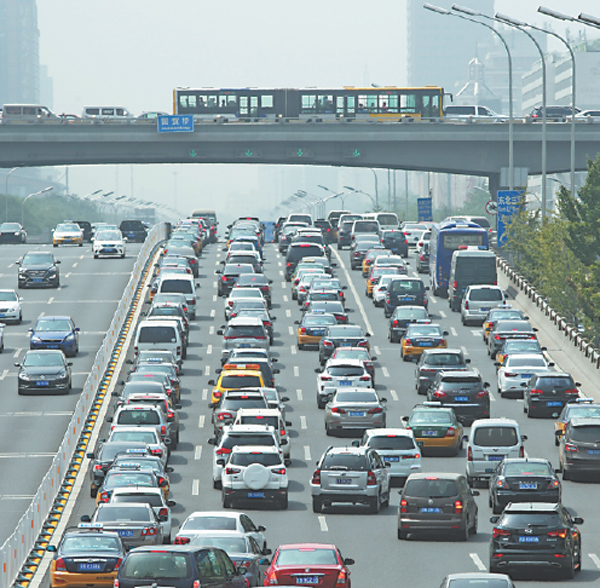Air pollution law in line for legislators' approval
Updated: 2015-08-25 07:20
By ZHENG JINRAN(China Daily)
|
|||||||||||
 |
|
Air pollution: Local governments would not be able to impose restrictions at will on vehicle use due to severe air pollution, according to the third draft of the Air Pollution Control Law. China Daily |
The national legislative body is reviewing the third draft of the Air Pollution Control Law, which tightens controls on emissions from vehicles and vessels and is expected to be passed this week.
If severe air pollution covers a city, the government will usually issue emergency measures including restricting the use of vehicles to reduce car emissions, which has been a common practice adopted in many cities like Beijing.
In the first and second drafts of the law on air pollution control, there were stipulations that local governments had the right to impose restrictions on vehicle use due to severe air pollution, and release the details of the restrictions including the zones affected after hearing suggestions from experts and the public.
But the third draft has removed that stipulation, amid concerns that it would affect social order and after many residents had expressed their concerns and disagreements, the Legal Affairs Committee of the Standing Committee of the National People's Congress said on Monday.
The current restrictions on vehicle use are mostly limited to urban areas. If the law had been passed with that stipulation, it would have expanded this coverage across the entire country and had an uneven impact on traffic conditions. Therefore, the national legislative body deleted it and suggested that local governments set up their own regulations.
Applauding the withdrawal of this stipulation, Ma Yong, a researcher at a law center under the Supreme People's Court, said restrictions on the use of vehicles have more impact on alleviating traffic congestion than air pollution control.
In addition, the third draft has added several stipulations including setting up national standards on fuel quality and requiring petroleum refining enterprises to follow the standards in their production to reduce the emission of air pollutants.
The draft requires buffer zones to reduce emissions from vessels, a major source of pollutants for coastal cities, it said.
This is the third draft of the Air Pollution Control Law, and it is expected to be passed on Thursday, since most draft laws in China usually have third reviews before becoming laws. However there are some exceptions. For example, the Environmental Protection Law had four reviews before it was passed in April last year.
The drafts of the law have received many suggestions from experts and researchers, including Ma Yong, the law center researcher.
He suggested that the draft should call for setting up a national platform containing real-time emissions data about polluting companies, since this would be an effective way to deter them from excessive emissions.
"It's not enough (as the draft stipulated) to release information on polluting companies in major regions," he said.
Chang Jiwen, a researcher on environmental policies at the Development Research Center of the State Council, said the drafts did not have effective measures to promote regional joint controls on air pollution, which Chang said would reduce the impact of the law.
Related Stories
Prospects for China's Air Pollution Control: Problems and Policy Options 2015-08-18 16:06
9.4 trillion yuan pledged to fight water, air pollution 2015-08-14 11:15
New regulations help to lower air pollution levels 2015-07-10 07:28
Survey finds air pollution most concerned environmental problem in Beijing 2015-06-26 14:40
Lawmakers mull stricter air pollution control law 2015-06-24 17:47
Beijing, neighbors to draft regional air pollution treatment plan 2015-06-17 16:33
Today's Top News
China equities collapse sparks global markets sell-off
Top lawmakers mull amnesty for prisoners who took part in wars
UK airshow crash toll to rise
Stocks plunge most since 2007 as support measures fail
Hugo Award to open new chapter for Chinese sci-fi
Britain reopens embassy in Tehran
Frace raises vigilance after
train shooting
Greek opposition tries to form government
Hot Topics
Lunar probe , China growth forecasts, Emission rules get tougher, China seen through 'colored lens', International board,
Editor's Picks

|

|

|

|

|

|






